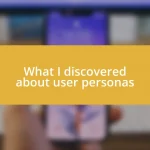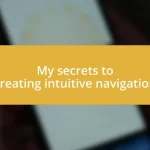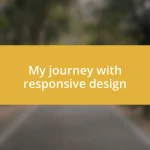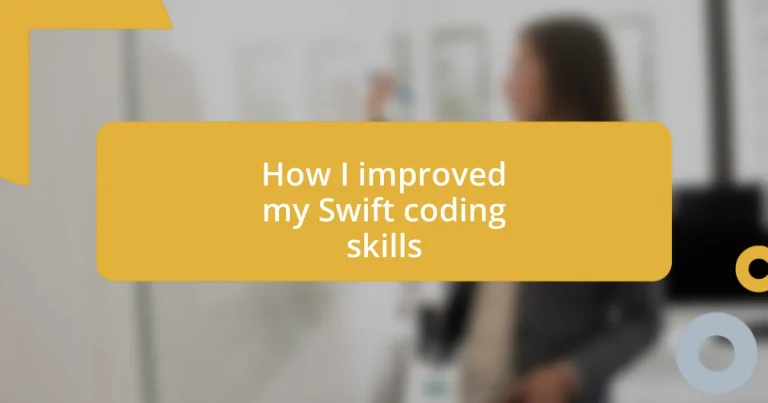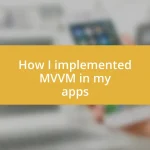Key takeaways:
- Understanding data types and control flow in Swift enhances coding skills and problem-solving abilities.
- Setting SMART goals and sharing them with peers fosters accountability and motivation in the learning process.
- Utilizing online tutorials actively through practice, community engagement, and reflection deepens understanding.
- Joining coding communities and seeking mentorship provides support, feedback, and inspiration for personal growth.
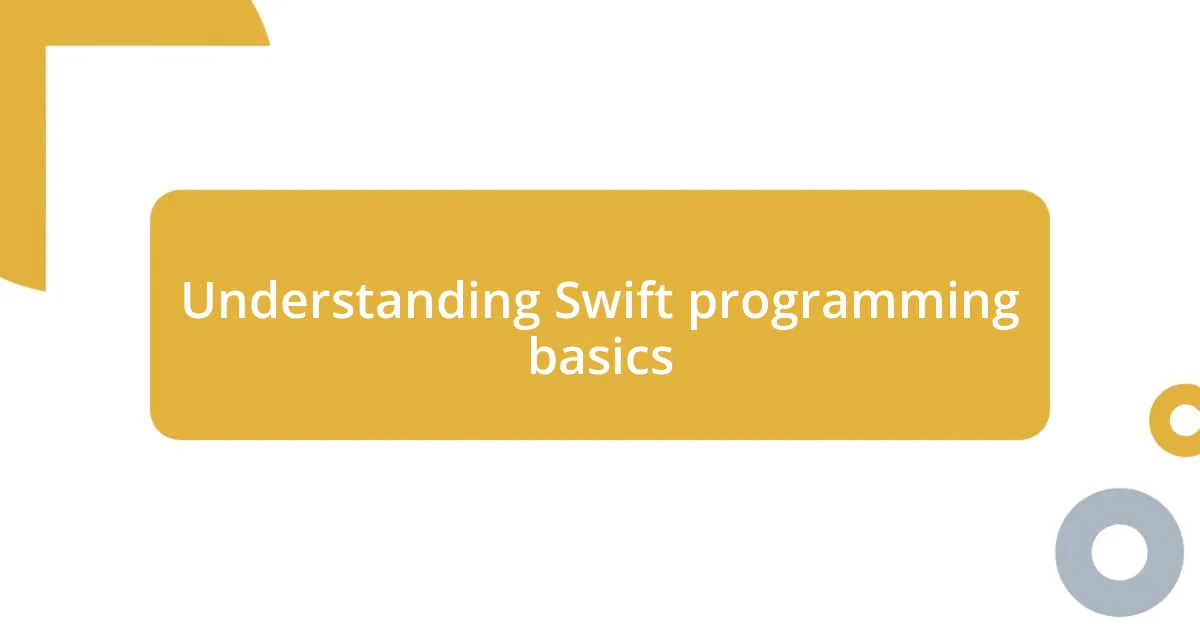
Understanding Swift programming basics
When I first dove into Swift, I was surprised by how intuitive the syntax was compared to other languages I’d tried. It felt like picking up a new language that flowed rather effortlessly, and I remember feeling a surge of excitement every time I successfully ran my first few lines of code. Have you ever experienced that rush of accomplishment when something finally clicks? Swift’s clean and concise structure made that happen for me repeatedly as I learned.
One of the foundational concepts in Swift is understanding data types, such as Strings, Ints, and Booleans. I distinctly recall a moment when I mistakenly assumed any data could fit into a String, only to experience a frustrating crash in my app. It taught me that recognizing the appropriate data types is crucial to writing effective code. Have you ever overlooked something small that ended up causing major issues? Those experiences can be the most humbling teachers.
Control flow statements, like loops and conditionals, are also fundamental to mastering Swift. I vividly remember my first successful “if” statement; it felt like I had opened a door to a new realm of possibilities. I found myself questioning everything around me—how can I apply this logic to real-world problems? This curiosity was a pivotal moment in my coding journey, pushing me to explore further into the language. It’s intriguing how understanding these basics not only improves coding skills but also enhances your problem-solving abilities.
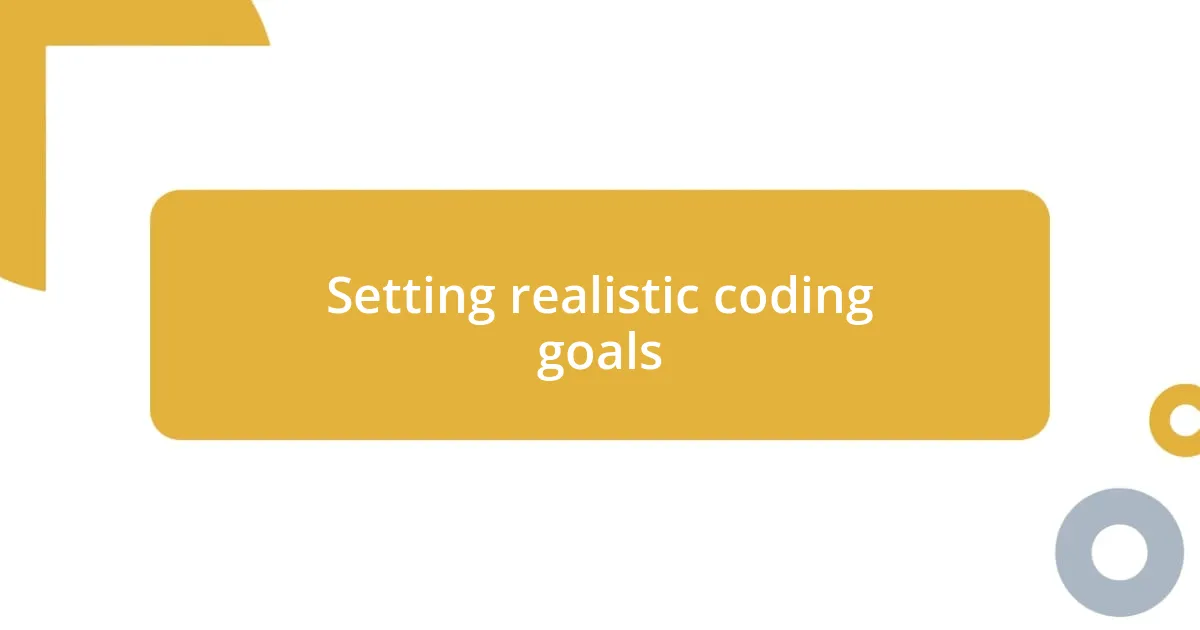
Setting realistic coding goals
Setting realistic coding goals is crucial for sustained improvement. I recall setting a goal to build an app in a month. Initially, it felt exhilarating, but I soon realized that I lacked the experience to meet that deadline. Breaking it down into smaller tasks, like learning one new Swift concept a week, made the process manageable. Have you ever felt overwhelmed, only to find clarity by simplifying your objectives?
Establishing SMART goals—Specific, Measurable, Achievable, Relevant, Time-bound—has been a game-changer for me. I used to aim for broad goals like “become a better coder,” which felt vague and unattainable. By switching to something like “master closures in two weeks,” I found that I could track my progress meaningfully. I can still remember the satisfaction I felt the first time I understood how closures worked. It transformed the way I approached function handling in Swift.
Moreover, sharing these goals with fellow coders has been incredibly beneficial. I remember a coding buddy and I agreed to check in every week about our progress. It not only kept me accountable but also fostered a sense of community. When we celebrated small wins together, it added a motivational layer that made the learning process enjoyable. Have you considered how social accountability could boost your coding journey?
| Goal Type | Description |
|---|---|
| Vague Goal | I want to be a better coder |
| SMART Goal | Master closures in two weeks |
| Group Goal | Join a coding buddy for weekly check-ins |
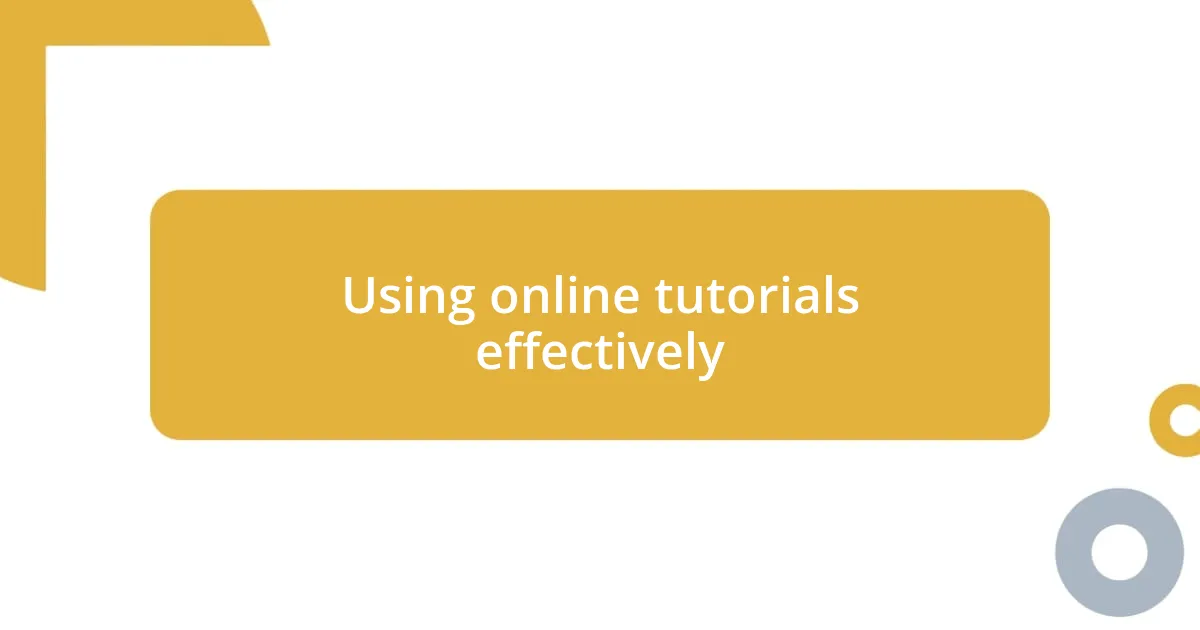
Using online tutorials effectively
Using online tutorials effectively requires a thoughtful approach. I remember the first time I stumbled upon a tutorial that was structured just right—step-by-step and sprinkled with practical exercises. It felt like being guided by a knowledgeable friend who understood my struggles and walked me through the concepts. I found myself not just watching but actively participating, which made all the difference. Have you ever noticed how engaging content just calls for your attention?
To make the most of online tutorials, I learned a few strategies that might help you too:
- Choose reputable sources: Look for tutorials from established educators or platforms. Their methods and explanations often clarify the hardest concepts.
- Practice alongside: As I followed along with the coding examples in the tutorial, I’d pause and try coding independently on my own. This exploration led to those “aha” moments that have been so rewarding.
- Take notes: Writing down key points solidified my understanding. It was like creating my personal reference guide.
- Engage with the community: Many tutorials have comment sections or forums. I found asking questions there turned my learning from a solitary journey into a shared experience, adding valuable insights.
- Reflect on what you’ve learned: After completing a tutorial, I’d spend time summarizing the main concepts in my own words. It helped reinforce my understanding and revealed areas I needed to revisit.
By harnessing these strategies, I transformed tutorial-watching from passive observation to an active, enriching learning experience.
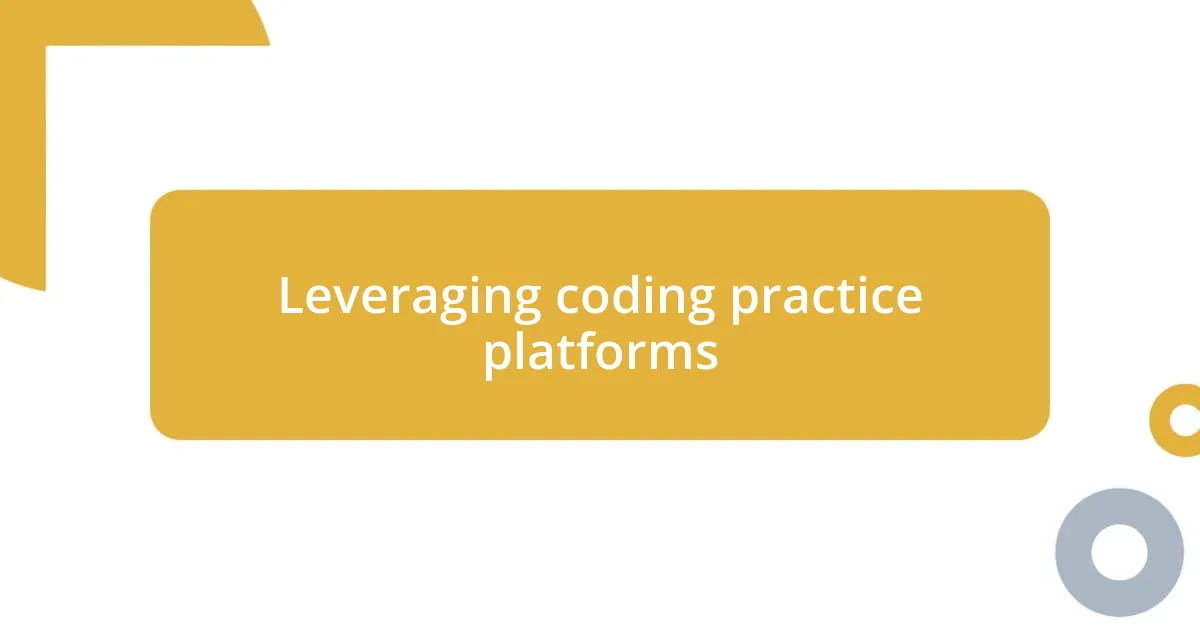
Leveraging coding practice platforms
Leveraging coding practice platforms has been a game changer for me. I vividly remember stumbling upon platforms like LeetCode and HackerRank, which offered a treasure trove of coding challenges that seemed daunting at first. I started with easy problems and was surprised by how quickly my confidence grew. Have you ever tackled a problem so challenging it felt like climbing a mountain, only to realize you’re stronger than you thought once you reach the summit?
What I discovered through these practice platforms is that they don’t just test your skills; they also provide a community. I recall joining a coding challenge that had a leaderboard. It introduced a fun element of competition, and suddenly, I found myself more motivated than ever to practice daily. This sense of belonging pushed me to engage with others’ solutions, enabling me to learn different approaches to problems. Have you ever felt that rush of joy from both personal achievement and community connection?
Additionally, the instant feedback these platforms provide is invaluable. After submitting a solution, seeing the results almost immediately made me eager to improve. I recall one instance where my first attempt failed miserably. Instead of being disheartened, I embraced it as an opportunity to analyze the mistakes, and the insights I gained not only improved my coding skills but also my problem-solving mindset. Every misstep felt like a stepping stone toward mastery. How do you approach feedback in your own coding journey?
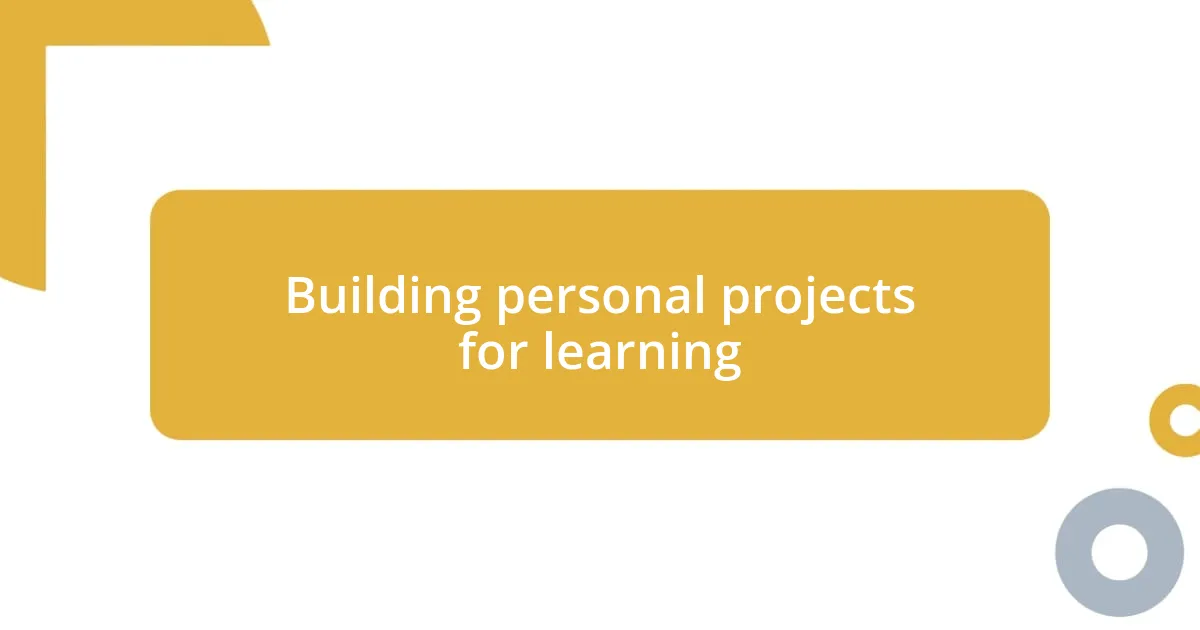
Building personal projects for learning
Building personal projects has been a cornerstone of my learning journey in Swift. I recall the thrill of creating my first app, a simple to-do list that evolved from scribbled ideas into functioning code. Each feature I added sparked a sense of pride and was a tangible representation of my growth. Have you ever felt that rush of excitement when your code actually works, bringing an idea to life?
A significant lesson I learned from personal projects is the value of experimentation. I once decided to add a unique twist to my to-do list by incorporating a color-coding system. The process taught me not only Swift but also how to creatively solve problems. Everything from layout to functionality became hands-on learning. Instead of reading about app development, I was experiencing it firsthand. Doesn’t it feel incredible to build something that reflects your creativity and knowledge?
The journey through personal projects is also filled with moments of frustration. There were times when bugs felt insurmountable, leaving me staring blankly at the screen. Yet, every challenge presented a real opportunity to dig deeper. I learned to troubleshoot more effectively, often seeking solutions online or in community forums. I remember how satisfying it was to finally solve those stubborn issues. Reflecting on those moments, I realize that navigating struggles is just as crucial as celebrating successes. What challenges have made you a stronger coder?
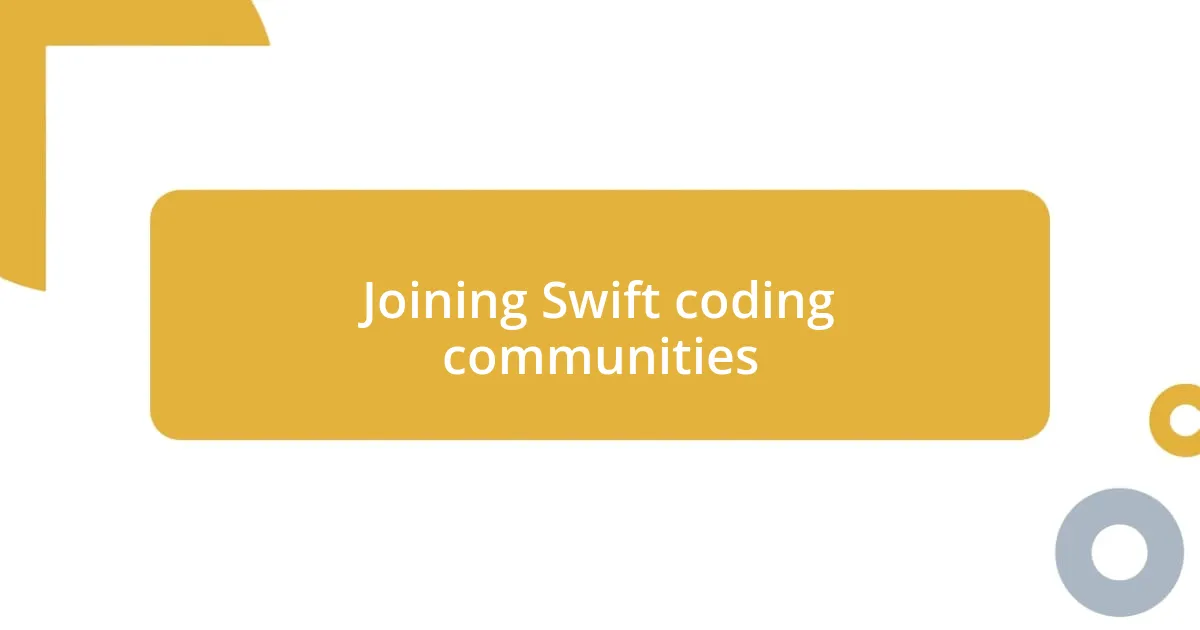
Joining Swift coding communities
Joining Swift coding communities has been a transformative experience in my coding journey. When I first ventured into these spaces, I felt a mix of excitement and trepidation. I remember logging into my first Swift community forum and being overwhelmed by the wealth of information shared by fellow developers. Have you ever felt that surge of inspiration when surrounded by like-minded individuals? Engaging in conversations with someone who faced similar coding challenges made me feel less isolated and more motivated.
One standout experience was participating in a local Swift meet-up. I nervously approached a group of seasoned developers, unsure if I belonged. To my surprise, they welcomed my questions with enthusiasm, offering insights that had taken them years to master. It was eye-opening! I learned that sharing struggles fosters growth. I even found a mentor who guided me through several tricky coding problems. Have you sought guidance from someone further along in their journey? Those early connections laid the foundation for my continued improvement.
Additionally, I frequently utilize online platforms like Slack and Discord, where Swift enthusiasts congregate. I remember asking for help with a particularly gnarly bug and receiving a flood of responses almost instantly. The collaborative atmosphere was electrifying. It reminded me that coding doesn’t have to be a solitary endeavor; teaming up with others can lead to breakthroughs. Have you ever experienced such camaraderie? The support I found within these communities not only honed my technical skills but also fostered lasting friendships, making me feel part of something bigger.
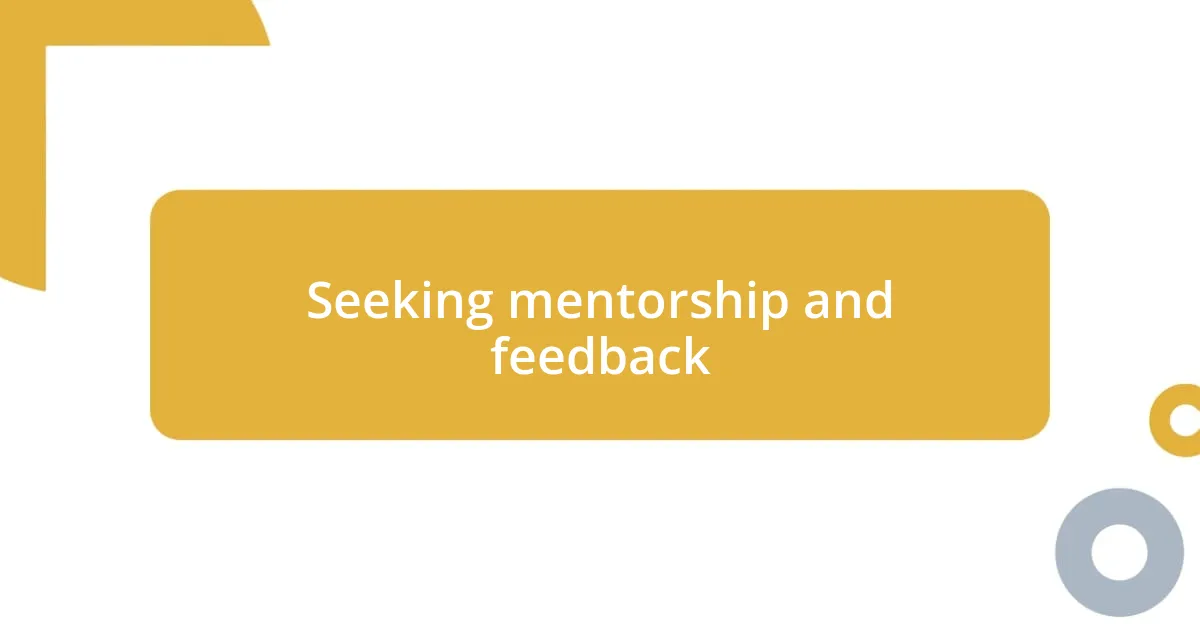
Seeking mentorship and feedback
Seeking mentorship has been a crucial step in refining my Swift coding skills. I vividly recall reaching out to a more experienced developer after hitting a wall with my project. I nervously composed my message, wondering if they would even respond. To my delight, not only did they reply, but their feedback illuminated my misconceptions and opened my eyes to better coding practices. Have you ever received advice that felt like someone turned on the lights in a dark room?
Feedback is a powerful tool that often goes underestimated. One memorable instance was when I submitted my first app for code review in a community forum. The feedback I received ranged from simple formatting suggestions to deeper insights about my app’s architecture. It was challenging to see flaws in my work, but I realized that each piece of criticism was a stepping stone for improvement. Isn’t it fascinating how a different perspective can lead to such growth?
Mentorship and feedback not only enhance technical skills but also boost confidence. I remember when my mentor pushed me to tackle a project I thought was beyond my capabilities. Taking on that challenge was initially daunting, but the ongoing guidance I received not only built my skills but also my belief in myself as a developer. Have you ever taken a leap of faith, not just in your coding but in your abilities? That experience was a game-changer for me, illustrating how vital it is to seek guidance and accept constructive input in our development journeys.

